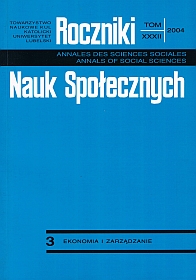The Controversy Aver the Functions of the State in the Contemporary Economy
Abstract
The question concerning the range of the functions of the state in contemporary market economies is not a new one, although it is a basic issue. It may still be encountered in the present day macro-economic discussions that express the anxiety connected with the great and ever increasing participation of the public sector in many countries' economies.
The approaches to this issue may be divided into ones emphasizing the role of the state in economy and society, and hence proving that it is necessary for such a great public sector (and public finances sector) to exist; and ones considering the market as the basic regulator of the economy, and hence aiming at limiting the role of the state. These opposing approaches are presented against the background of the three basic functions of public finances: allocating, redistributing, and stabilizing ones.
Concerning the first function – as there are lots of critical opinions, J. Gray's views deserve attention, concerning the state financing (but not producing) the access to public goods.
Within the redistribution function of the state the concept of the welfare state is the most important one.
And finally, the stabilization function of the state is dominated by the views of Keynes and his followers on the one hand, and the classical economics and its protagonists on the other.
When discussing the state versus market issue one should stress the ideas of ordoliberals who developed the system of social market economy and contributed to the German economic miracle.
The most recent theories are reflected in real life, in the experimental actions undertaken by the governments of some countries (e.g. Reaganomics in the USA, Thatcherism in Great Britain). However, they did not succeed in fighting the unemployment and making the economic growth more dynamic. This is why the process of investigating and reforming the state continues.
References
Belka M. (1991), Główne nurty współczesnej ekonomii, w: Współczesna teoria ekonomii. Główne nurty i problemy, Warszawa: Instytut Nauk PAN, „Studia i Materiały”, z. 40.
Domańska E. (1992), Wokół interwencji państwa w gospodarkę, Warszawa: PWN.
Ferlie E., Ashburner L. (1996), The New Public Management in Action, Oxford: Oxford University Press.
Gray J. (1989), O rządzie ograniczonym. Warszawa: Wydawnictwo A. Smitha.
Grimm K. (1992), Socjalna gospodarka rynkowa. Koncepcja – rozwój – problematyka, Warszawa: Fundacja im. F. Eberta w Polsce.
Hirsh F. (1977), Social Limits to Growth, Cambridge, Mass–London: Harvard University Press–Rautledge and Kegan Paul.
Kowalik T. (2000), Współczesne systemy ekonomiczne, Warszawa: Wyd. Wyższej Szkoły Przedsiębiorczości i Zarządzania im. L. Koźmińskiego.
Leipold H. (1994), Modele gospodarki rynkowej – koncepcje i rzeczywistość, w: E.Okoń-Horodyńska (red.), Rola państwa w społecznej gospodarce rynkowej. Materiały konferencyjne, Ustroń 1994, Kraków: Wyd. Akademii Ekonomicznej w Krakowie.
Lewandowski J. (1991), Neoliberałowie wobec współczesności, Gdynia: „Atext”.
Małachowski W. (red.) (1999), Polska-Niemcy a gospodarka rynkowa, Warszawa: Wydawnictwo SGH.
Michalewski A. (1972), Ekonomia dobrobytu. Prezentacja i próba analizy, Warszawa: PWE.
Schumpeter J. (1995), Kapitalizm, socjalizm, demokracja, Warszawa: PWN.
Snowdown B., Vane H., Wynarczyk T. (1998), Współczesne nurty teorii makroekonomii, Warszawa: PWN.
Wojtyna A. (1990), Nowoczesna państwo kapitalistyczne a gospodarka, Warszawa: PWN.
Copyright (c) 2004 Roczniki Nauk Społecznych

This work is licensed under a Creative Commons Attribution-NonCommercial-NoDerivatives 4.0 International License.


